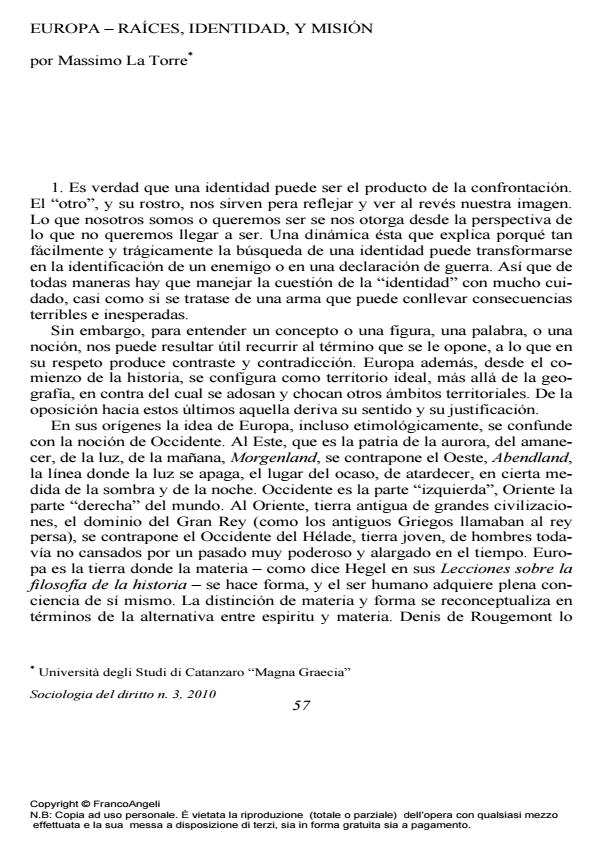Europe: roots, identity and mission
Journal title SOCIOLOGIA DEL DIRITTO
Author/s Massimo La Torre
Publishing Year 2011 Issue 2010/3
Language Spanish Pages 16 P. 57-72 File size 358 KB
DOI 10.3280/SD2010-003003
DOI is like a bar code for intellectual property: to have more infomation
click here
Below, you can see the article first page
If you want to buy this article in PDF format, you can do it, following the instructions to buy download credits

FrancoAngeli is member of Publishers International Linking Association, Inc (PILA), a not-for-profit association which run the CrossRef service enabling links to and from online scholarly content.
There is a recurrent controversy, a sort of Kulturkampf, about European identity and self-definition. Much of this is already well-rooted in European history, however, constituting a permanent quest for an idea of what Europe is and what it means. Tackling this, the author sets out to develop a narrative of this history and discern its most characteristic features and meaning, which comprise primarily an attitude of research and thinking, of pluralism and tolerance: a special notion of happiness. Europe has evolved into what it is today mainly by relating to other cultures. Europe needs this "otherness" as a mirror in which to see itself. This enables a first but fundamental conclusion to be drawn: there is no place for any kind of essentialism or fundamentalism when considering our identity as Europeans. A constructive approach is the only way for Europeans to keep faith with our history. Ultimately, Europe’s destiny is one of its own invention.
Esiste oggigiorno una controversia ricorrente, una sorte di <i>Kulturkampf</i>, intorno all’identità e l’autodefinizione dell’Europa. Gran parte di questa è, però, già depositata nella storia europea, in uno sforzo permanente teso a scoprire una idea della consistenza dell’Europa e del suo significato. L’articolo, di conseguenza, tenta lo sviluppo di una narrativa di una tale storia, onde scoprirne i tratti e il significato più caratterizzanti. Questi si trovano principalmente in un atteggiamento alla ricerca e la riflessione, al pluralismo e alla tolleranza, in una particolare nozione di felicità. È soprattutto tramite i suoi rapporti con altre culture che l’Europa si è costruita. L’Europa ha bisogno di questo "altro", che le serve per rispecchiarsi. Questo serve per giungere ad una prima, ma fondamentale, conclusione: non vi è posto per essenzialismi e fondamentalismi di qualunque forma quando si considera l’identità degli europei. Un approccio costruttivo è l’unico che ci permette di tener fede alla nostra storia. Si potrebbe dire, infine, che il destino europeo è di sua propria invenzione.
Keywords: Europe, Identity, Citizenship, Political system, pluralism
Massimo La Torre, Europa - raíces, identidad, y misión in "SOCIOLOGIA DEL DIRITTO " 3/2010, pp 57-72, DOI: 10.3280/SD2010-003003